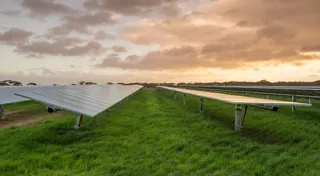CEFC welcomes Investa achievement on Australian-first Science Based Target
The CEFC has congratulated Investa on its success in achieving Australia’s first approved real estate Science Based Target (SBT).
The CEFC invested $110 million in equity in the $4.1 billion Investa Commercial Property Fund (ICPF) in 2016. A key element of the investment included a landmark co-operation agreement between the CEFC and Investa to promote the increased uptake of energy efficiency design principles and technologies in the built environment, including through SBTs.
Read our media release and fact sheet
Investa has now announced it has achieved Australia’s first approved real estate SBT. It said the SBT verified its ambitious target to achieve net zero carbon emissions by 2040 and re-enforced its leadership in committing to the rigour and quality of the globally-recognised SBT framework.
CEFC Equity lead Rory Lonergan said: “We congratulate the team at Investa on this important achievement, which reflects Investa’s continued leadership in delivering sustainability in the built environment. Targets are an important way of accelerating the adoption of integrated energy efficiency and renewable energy technologies, which are critical if we are to reduce emissions across our economy.”
The SBT Initiative (SBTi) aims to help businesses pursue bolder solutions to climate change. It is a joint initiative by the global CDP (formerly the Carbon Disclosure Project), the UN Global Compact, the World Resources Institute and the World Wildlife Fund.
To qualify for an approved SBT, Investa’s carbon reduction strategy was required to demonstrate its alignment with climate change science, as well as adherence to the Paris Agreement 2 degree commitment. It was also required to meet a set of stringent sector-based emissions reduction targets for Scope 1, 2 and 3 emissions.
The SBT framework also requires certifying organisations to address supply chain (Scope 3) emissions, which in Investa’s case relates to tenant emissions.
Investa’s base building target is underpinned by its carbon reduction strategy, which targets operational efficiency, building materiality, energy production, procurement and stakeholder engagement.
In 2018, in line with its SBT commitment, Investa expanded on its base building target by setting an industry first, Scope 3 emissions reduction target of 42 per cent by 2040, over the one million square metres of office space occupied by tenants across its portfolio.
Investa Corporate Sustainability General Manager Nina James said: “Investa has worked with the global SBTi organisation to refine a pathway for Australian property to verify carbon reduction targets and is proud to be the first Australian company formally approved for a real estate Science Based Target.
“To date, the Australian real estate sector limits emission reporting to Scope 1 and 2 emissions, which reflect base building operations only. As a global leader in sustainability, Investa has gone beyond managing just our own corporate emission responsibilities, to now target reductions in total building consumption, enabling our tenants to join us in transitioning to a low carbon economy and having a broader impact on the communities in which we operate.”
Read the Investa media release
The property sector contributes nearly 25 per cent of greenhouse gas emissions in Australia, making it an important area of focus for the CEFC. The CEFC has invested more than $1 billion in property-related projects, with a strong focus on demonstration projects with the ability to deliver best-in-class performance around energy efficiency and the integration of renewable energy into new and existing buildings.
Mr Lonergan added: “We recognise it is not possible for our finance to directly influence the emissions and energy profile of every asset in the economy. By working with industry leaders such as Investa, we are providing finance for market-leading projects, which can also provide practical insights for others to adopt. This is an innovative way for us to maximise the impact of our finance. It is also an important way of developing new investment vehicles to meet the growing investor appetite for deeper exposure to sustainable investment.”
ABOUT THE SCIENCE BASED TARGETS INITIATIVE
The Science Based Targets initiative (SBTi) mobilises companies to set science-based targets and boost their competitive advantage in the transition to the low-carbon economy. It is a collaboration between CDP, the United Nations Global Compact, World Resources Institute, and the World Wide Fund for Nature and one of the We Mean Business Coalition commitments. SBTi defines and promotes best practice in science-based target setting, offers resources and guidance to reduce barriers to adoption, and independently assesses and approves companies’ targets. www.sciencebasedtargets.org
Media release, 2019




